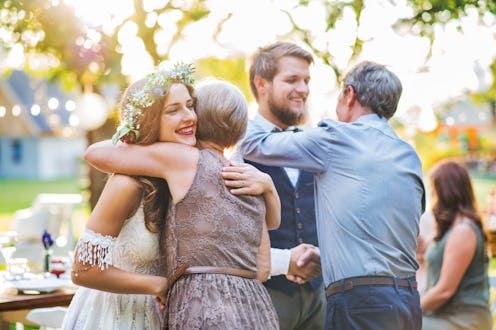
Even though you're supposed to be having a good time, it can be tough to focus on your wedding when you have divorced parents. Depending on their relationship, you might feel the need to keep an eye on them, to ensure they're getting along. Or you might find yourself in the middle of some drama, and not know what to do.
It can result in a lot of stress, but thankfully there are ways to make it easier on yourself, your partner — and your parents. And it can all start with looking at things from their perspective. After all, weddings have a way of serving as a mirror for your own relationship, Emily Pfannenstiel, LPC, a licensed professional counselor who specializes in relationships, tells Bustle. "So though [your] parents might be happy for [you], they may also be experiencing many other big — and mixed — emotions," she says.
They might zero in on their own divorce, and it may leave them wishing things had ended differently. As Pfannenstiel says, "There is so much weight behind this monumental event in their child's life, especially if the parents always pictured navigating that time with their (now ex-) spouse."
And, if the wedding will be bringing them together (or at least into the same room) for the first time in years, it can make it even more difficult. It's a lot to digest, but all you need to do is remain as understanding as possible, and plan ways to ease the tension.
"It’s really necessary to draw boundaries for yourself, your partner, and for your wedding day and have these conversations well before your big day and as often as necessary," Jaclyn Lopez Witmer, a licensed clinical psychologist at Therapy Group of NYC, tells Bustle.
This might include deciding early on how your parents will interact, and what roles everyone will play. Talk about what would make everyone most comfortable, and build the ceremony from there. "It’s your day, you make the rules," Lily Ewing, MA, LMHCA, a Seattle-based therapist, tells Bustle. "However, when making plans and setting boundaries, it’s important that you consider everyone else’s feelings as well."
If you've always dreamed about your parents sitting together during dinner, for example, ask them how they'd feel about it and explain why it's important to you. If they really can't handle it, it'll be in everyone's best interest to alter those plans and find another way. By being flexible, you may have a better result anyway.
It's also important to keep your partner and friends in the loop, so they can offer as much support as possible. And don't be afraid to "give your bridesmaids jobs to help support you on your big day," Pfannenstiel says. "That's what they're there for." Have one friend keep an eye on your parents so you don't have to, put another in charge of keeping the party going, and so on.
You might even want to go so far as talking to other folks who will be a part of the planning process. "Fill your vendors (and wedding planner, if you have one) in as much as possible, with as much information and transparency about the dynamics between your parents and how best to address them and keep them feeling important and respected," Lopez Witmer says. And, if problems do arise, assign a point of contact, Lopez Witmer says, such as a sibling or planner. That way, if anyone needs to vent, or if your parents aren't getting along, they can defuse the situation with you even knowing about it.
All logistics aside, dealing with divorced parents may also bring up worries about your own relationship. So if you start feeling pessimistic, "remind yourself that while your parents and their relationship has shaped you and your experiences," Lopez Witmer says, "the marriage you are entering is not their marriage — it’s yours." And you can have an entirely different outcome.
All of that said, it may not be easy to navigate a wedding with divorced parents, and it may come down to keeping your head up, no matter what happens. After all, "the only person we can control is ourselves," Pfannenstiel says. So focus on taking good care of yourself and enjoying the day with your partner, because that's really what it's all about.
Experts:
Emily Pfannenstiel, LPC, licensed professional counselor who specializes in relationships
Jaclyn Lopez Witmer, licensed clinical psychologist at Therapy Group of NYC
Lily Ewing, MA, LMHCA, Seattle-based therapist